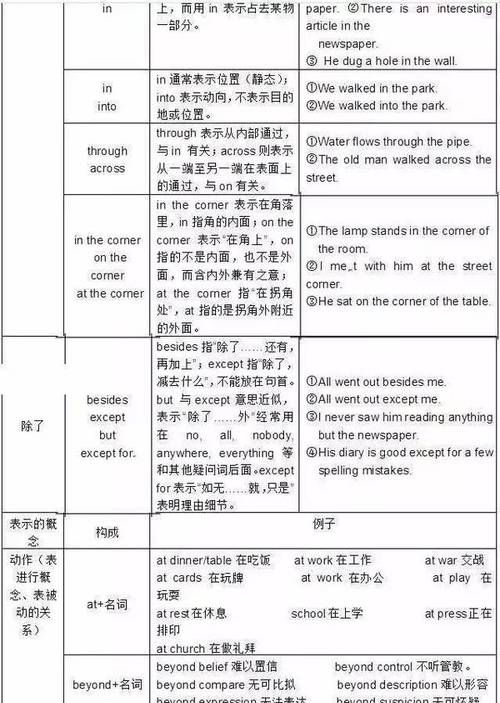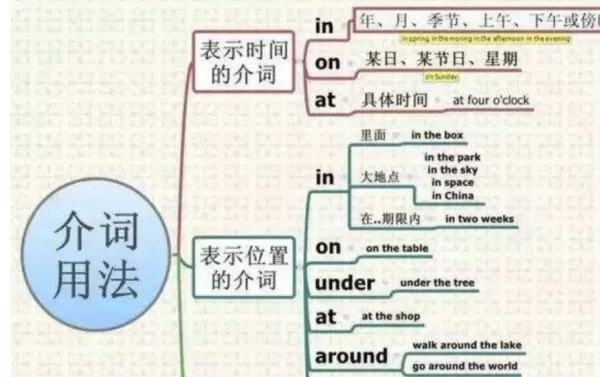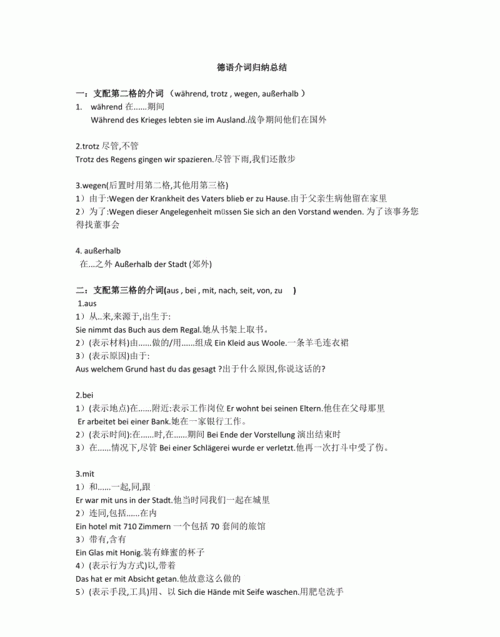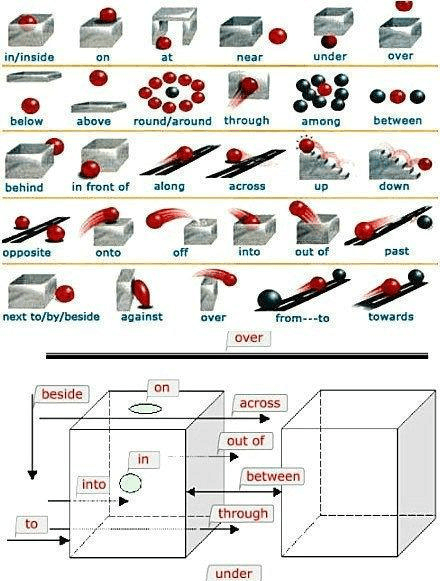本文目录
英语介词用法最全总结
英语常用介词基本用法:
表示方位的介词:in, to, on
1. in 表示在某地范围之内。
Shanghai is/lies in the east of China. 上海在中国的东部。
2. to 表示在某地范围之外。
Japan is/lies to the east of China. 日本位于中国的东面。
3. on 表示与某地相邻或接壤。
Mongolia is/lies on the north of China. 蒙古国位于中国北边。
表示计量的介词:at, for, by
1. at 表示“以……速度”“以……价格”。
It flies at about 900 kilometers an hour. 它以每小时900公里的速度飞行。
I sold my car at a high price. 我以高价出售了我的汽车。
2. for 表示“用……交换,以……为代价”。
He sold his car for 500 dollars. 他以五百元把车卖了。
注意:at表示单价(price) ,for表示总钱数。
3. by 表示“以……计”,后跟度量单位。
They paid him by the month. 他们按月给他计酬。
Here eggs are sold by weight. 在这里鸡蛋是按重量卖的。
表示材料的介词:of, from, in
1. of 成品仍可看出原料。
This box is made of paper. 这个盒子是纸做的。
2. from 成品已看不出原料。
Wine is made from grapes. 葡萄酒是葡萄酿成的。
3. in 表示用某种材料或语言。
Please fill in the form in pencil first. 请先用铅笔填写这个表格。
They talk in English. 他们用英语交谈。

小学介词的用法归纳
介词又叫做前置词,表示它后面的名词或代词(或相当于名词的其他词类;短语或从句)与其他句子成分的关系。介词通常位于名词或代词之前。
1、后跟名词。
例如:at school 在上学,in person 亲自,on duty 值班,at work 在上班,by hand 用手,with pleasure 乐意等。
2、后跟代词。
I'm on it. 我来办。stand by him.站在他身边。few of them.他们中的少数几个。part of it.其中一部分。depend on you.指望你。
3、后跟动名词:
do well in dancing.擅长跳舞。be good at swimming.擅长游泳。how about going traveling.去旅行怎么样。be fond of cycling.酷爱骑行。

介词的主要用途
1、 表示时间
at noon 在中午,at nine 在 9 点,at night 在夜里,at the age of 14 14岁时。
2、表示方位
at: 在小地方,在......附近,in : 在大地方,在......内部,on : 在......上面(接触),和......接壤
to : 表示比较精准的“对着”,above :在......上方。
英语中时间的介词用法大全
1、介词的分类与语法功能
(1)介词是虚词,不能单独作句子成分,必须与名词、代词(或相当于名词的其他词类、短语或从句等)构成介词短语,在句中充当一个成分。介词分为:简单介词,如at、in、for等;合成介词,如within、inside、onto、througout等;短语介词,如according to、out of、because of、by means of、in spite of、instead of等。双重介词,如from behind / above / under、until after等。分词介词,如considering、including、judging(from / by) 等。
常见的介词宾语:名词、代词、动名词、从句、不定式等。如:
①It is going to rain this afternoon according to the weather
forecast.
②He quarrelled with her yesterday.
③He succeeded in passing the final exam.
④I’m still thinking of how I can fulfil the task ahead of time.
⑤The professor will give us a talk on how to study English well.
(2)介词短语在句中可作表语、定语、状语和宾补等。如:
①This machine is in good condition.(表语)
②Where is the key to my bike?(定语)
③Nothing in the world could live without air or water.(状语)
④She always thinks herself above others.(宾补)
2、介词搭配
(1)“动词+介词”搭配:注意特定搭配与同一介词与多个动词搭配意义不同的情况。
①rob sb. of sth. / clear the road of snow(“夺去、除去”意
义的动词与of 连用)
②supply us with food / fill the glass with wine(“供给”意义的动词与with连用)
③make a desk of wood / make bread from flour / make the material into a coat(“制作、制造”意义与of、from、into连用)
④介词 + the + 部位与动词的关系(=动词 + sb.’s + 部位,可换用)
strike him on the head(“击,拍,碰,摸”意义与on连用)
catch him by the arm(“抓,拉,拿,扯”意义与by连用)
hit the boy in the face(“肚,胸,眼,脸”等人体前部与in连用)
⑤prevent(stop, keep)sb. from doing sth.(“阻止,禁止”意义与from连用)
⑥persuade(advise, warn)sb. into doing sth.(“说服,建议”意义与into连用)
⑦buy sb. for sth.(leave、get、win、gain、lose等“得失”意义与for连用)
⑧tell sth.to sb.(show、teach、sing、write、read等“告知”意义与to连用)
⑨give sth. to sb.(give、allow、promise、pass、hand等“授予”意义与to连用)
注意:⑦⑧⑨可换成buy sb.sth.双宾结构。
⑩say to sb.(suggest、explain、apologize、murmur、whisper与“对象”连用必须用to)不可说suggest sb.sth.。
同一动词与不同介词搭配意义不同。
for(寻找) to sth. of(听说) on(拜访)
look to (眺望) agree with sb. hear call for(需要)
at(看) on sth. from(收到信) in(请)
同一介词与不同动词搭配,意义各异。
reply to the letter回信,sing(dance)to the music和……唱(跳),amount to 达到,加起来有……,devote to把……贡献给,drink to为……干杯,object to反对,look forward to 渴望,come to苏醒,belong to属于,search for搜……,ask … for … 寻找,use … for用作,leave for前往,take … for误以为,call of倡导,wait for等待,care for喜欢,make up for弥补损失,turn to求助(救)于,help oneself to随意,agree to同意,compare … to把……比作,send for派人去请(拿)……,sail for驶向,航向,set out for动身去,go in for爱好……。
(2)常见“形容词 + 介词”搭配。
of担心…… about / at sth.
afraid angry
for 替……而担心 with sb.
for sth.渴望…… different from与……不同
amxious
about sth. / sb担心…… different to … 不关心……
of讨厌 with sb.
tired strict
from/ with因……疲倦 in sth.要求严格
at擅长 with sb.受……欢迎
good for对……有益 popular in some place流行在……
of sb. to do so友好 for … 因……而流行
with + 名词或what从句
pleased helpful to对……有帮助
at + 抽象名词(听 / 看到……而高兴)
to sb.为人所知
known for因……而出名 be familiar with熟悉
as作为……出名 be familiar to为……熟知(悉)
sorry for … 替……后悔 disappointed at sth.失望
from缺席
rich in富有…… absent
in离开此地去了……
worthy of值得的,glad about sth. for sb.为某人某事高兴,far from离……远,grateful for sth. to sb.为某事感激某人,free from没有……(免除……),proud of(take pride in)自豪,satisfied with (by)满意,sure of / about确信,fond of喜欢,fit for适合,busy with sth.(in doing sth.)忙着干某事,full of充满,ready for准备,similar to相似,wrong with不对;有毛病……
(3)“名词 + 介词”要注意习惯搭配和意义区分。
the absence of water缺水
the hope of success成功的希望
have a chance of (for) entering college上大学的机会
take pride in them为他们感到骄傲
the key to the question问题的答案
a medicine for cough治咳嗽的药
the ticket for tomorrow明天的票
in Beijing去了北京
his abesence
from Beijing不在北京
to study学习方法
the way
of studying maths学习教学的方法
3、核心介词用法归纳与辨析
(1)表示时间的介词in的用法如下。
表示在某一较长时间内,如世纪、年、月、季、周等一般用介词in,
如:in the 1990s, in the year, in January, in(the) winter / summer / fall / spring, in the first week of May。
还可以用时段名词组成固定短语或词组。如:in a while, in no time, in the daytime, in a short while, in time, in the morning (afternoon, evening)。但要注意:
①at night / at noon, in the day(在白天),in the night(大夜间)。
②in five days(weeks, months, years)中in意思是“在……以后”。
③in和during表一段时间内两词可互用。如:in the night, during the night, in the war, during the war。但略有区别:当接表示“活动”的抽象名词时多用during,接“活动”的动名词及短语时用in。如:
during the discussion in discussing the problem
during her stay in Hubei in playing basketball
during the course of in digging the tunnel
(2)在具体的某一天或某天上午、晚上、前夕,常用on。
on Sunday(s).on Tuesday morning
on Christmas Day(但at Chrismas),on Christmas Eve, on
Children’s Day
on March 8, on the morning (afternoon, evening)of Oct.1
early on the morning of Oct.1(区别:in the late / early morning of Oct.1)
on a rainy night, on warm winter days
(3)表示某一时刻或某一点时间用at,如小时、分钟等。
at breakfast(supper, lunch),at six
at noon (sunrise, sunset, midday, night, midnight, dawn)
at the age of 15, at the time of war,但in time of danger/ trouble。
注意:有些时间名词前不接介词。如:
next day、last Sunday、that morning、these years
one、each、any、every、some、all修饰时,一般不用介词,如some day
one day、yesterday / afternoon,the night before
(4)till、until、to的用法。
①till(until)与持续动词连用一般用于肯定句中,与短暂动词连用一般用在否定句中。如:
He waited for me till twelve o’clock.
He didn’t get up till(until) 10 a.m.(不可用to).
但注意:在句首出现或强调句型中一般不用till而用until。如:
Not until 9 a.m.did Mr.Smith come back to school.
②to表“终结”时常用和from连用,但要注意不与from连用时的意
义。如:from July to September, from six to(till)eight(从……到……为止),但from morning till night(从早到晚),不能用to。from … to常构成习惯搭配,不可换用其他介词。(A)表持久连续、传递、转移的含义。from time to time(不时,有时),from day to day (天天),from hand to hand(不断传下去),from place to place(处处,到处),from side to side(左右摇摆),from door to door(家家户户),from house to house(挨家挨户),from shop to shop(一个商店接一个商店)。(B)表起始终止的全过程或程度加深、状态变化。from beginning to end(从头到尾,自始至终)(from the beginning to the end of…);from hand to mouth(仅能糊口),from bad to worse(越来越糟),from head to foot(从头到脚),
from top to bottom(整个地,彻底地),from top to toe(全身),from start to finish(自始至终,从头到尾)。(C)from one + 名词 + to another表示“依次”。如from one car to another(顺着车厢依次地)。(D)名词 + by + 同一单数名词,表示“一个一个地”,要与from … to短语区别开:one by one 一个一个地;little by little(bit)一点一点地;step by step 一步一步地,逐渐地(但by and by 不久以后);sentence by sentence逐句地;day by day一天一天地;side by side(with…)(和……)并肩,一起;shoulder to shoulder肩并肩地,齐心协力;hand in hand 手拉手,紧紧地;face to face面对面。
(5)in、after、later
①in + 一段时间:表示说话时为起点一段时间之后,与一般将来时连用;但表示“在……之内”时,用于各种时态。
②一段时间 + later(later是副词):表示某一具体时间或某一方面具体时间算起的一段时间后。
③after + 一段时间表示:“在……之后”,用于一般过去时;但时间为点时间时,只能用after,即after + 点时间,用于各种时态。
The doctor will be with us in six minutes.
She graduated in 1981,and eight years later she became the manager of the factory.
He received her letter after four weeks.
另外,in + 一段时间 + ’s + time 与 within + 一段时间的用法如下:
in a week’s time = in a week
They will arrive in three days’ time.(与将来时连用)
My brother’s birthday is in two weeks’ time.(作表语)
I’ll finish the book within two weeks.(within = in less than…用于各种时态,不超出,在……之内)
(6)地点介词at、on、in、to、across、through、over、under、below。
①at 在较小的场所,in在较大的场所,on在……的平面上。如at the
door、at the airport、at the station、at 55 Park Street、in China、in the north、in Asia、on the desk、on the wall等。
②on、at、in还可以表示两地相对位置。若A地属于B地,用in;A地位于B地的外面且有边缘衔接用on;无边缘的衔接有to。如:
Japan lies to the east of China.(范围之外)
Taiwan lies in the southeast of China.(范围之外)
Hunan province lies on the west of Hubei province.(毗邻)
The island lies off the coast of China.(相隔一定距离)
③地点介词的引申、比喻意义:in the sun在阳光下,in the dark(ness)在黑暗中,in the dark不知道,in freezing weather在严寒天气中,in the mud在泥中,in the earth在地下,in the desert在沙漠中,in a heavy rain 在大雨中,in the snow / wind在雪/风中,in public 当众,in trouble 在困境中,get into trouble陷入困境,out of trouble摆脱困难,beyond hope绝望。
④across在物体表面“穿过”;through则表示在三维空间内部“穿过”。如:
They walked across the playground.
I walked through the forest.
⑤over / under / above / below。
over、above译作“在……之上”;under、below译作“在……的下面”,其区别在于over、under表示一种直接的、垂直的上下关系;而above、below则表示一般的“高于”或“低于”,不一定是垂直“在上”或“在下”。如:
A little boat is now under the bridge.
There is a bridge over the river.
The sun sinks below the horizon(地平线)
The window is well above the tree.
⑥表示地点介词的静态性和动态性
He walked to the station(静态,表示方向和目的地)
He walked towards the station.(动态,只表示方向)
He is kind to (towards)us.(两者通用)
He is at the station.(静态,表示地点)
They arrived at the station.(动态,表示地点)
He swam away from the ship.(动态“离开”)
He stood away from the shop.(静态“远离”)
He fell onto the floor.(动态“到地面”)
The city is on the Changjiang River.(静态“平面”)
Go off the road.偏离了道路(动态“离去”)
Come along the river.沿着河过来(线)
across the fields 跨过田野……,over the desert跨越沙漠
across the river横跨这条河……,over the hill翻过这座山
be in the house(静态,在这里……)stay out of the car(静态,在……外)
go into the house(动态,进入)fly out of the country(动态,离开)
(7)表示方式、手段、工具的介词
①by the year/hour/day按年/小时/天。如He rent a house by the year(day,hour).(按by+the+单位名称)但to the pound按磅算,to the ton按吨计。
②表泛指的方式、手段
by post/mail邮寄,by telephone(radio),但on the phone/on the radio/on TV(电讯器材),by electricity用电,by machinery用电器,by hard work,learn sth.by heart,through the satellite,through practice,through his own efforts,through experience,through the telescop
③交通工具类
by bus/train/car/taxi(road)
by bike/bicycle,on horse back/on foot
by plane/jet/spaceship,by air
by ship/boat/lifeboat,by sea/by water
另外:by means of 用……方法,by way of 经由,取道于,用……方法,with the help (permission)of sb./with sb.’s help (permis-
sion)。
④表方式、手段的其他用法
He beat the dog with a whip.(with+工具机器)
One smells with his nose.(with+人体器官,但by hand“手工,用手”)
He stood up with pride.(with+情绪、情感、态度的名词)
注意:使用语言、材料、文字等用in。如in English(ink,pencil)。另外如:in high (good,low)spirits,in anger,in joy,in comfort,in sorrow,in safety,in danger,in need,in debt,in love,in fun,in pain,in tears,in surprise,in good(poor)health,in good order,in flower,in a way,in a low voice,in silence,in(with)satisfaction,in a hurry,in(with)words,live/feed on food,kneel on one’s knee,take(catch)sb.by surprise(出其不意)
(8)表示“除……之外”的几组常用介绍比较。
①besides 除……以外,(还有)。作副词时意思是“而且,更何况”。
Well all went to the cinema besides Shaw.除了肖外,我们都去了电影院。
It was too late to see a film, and besides, I was tired.
②except除去,除……之外(不再有)。
We all went except John.我们都去了,约翰没有。
在否定句中,两词可以换用,如:
He has no other hats except / besides this one.
③except for除了……(对句子主题进行细节校正或附加说明)后接名词、代词或what从句,此时与except that + 句子意思相同。
He was very clever except for carelessness.
④except that … 除了……一点以外。
He has not changed except that he is wearing dark glasses.
⑤but与except
but和except在表示“除了……以外”时可以通用,但应注意以下三点:
①前面有不定人词、疑问代词在意义上对称时,多用but。
All but one are here.
Nobody but I likes making model ships.
②后接不定式短语为排除对象时,多用but。
He has nothing to do but wait.(前有do,后省to)
③but与一些固定结构连用。
have no choice but to do sth.只得做某事,can not but do sth.不得不,can not help but do sth.不得不……,but for … 如不是……
(9)between与among.
between通常指两者之间。也可以用于三者以上的两者之间。如:
Ann is between Tom and Bill.
Switzer land lies between France, Germany, Australia and Italy.
They soon finished the work between themselves.(共同,合作)
She was busy between cooking, washing, sewing and looking after the baby.(表示接连不断地,一个接一个地忙这忙那)
A horse can be seen between trees now.
among表示三者以上之间。如:
The story is said to have happened in a village among the hills.
He was happy to be among friends again.
We must agree among ourselves.(一起,共同)我们必须达成共识。
London is among the largest cities.( = one of与最高级连用)
(10)表原因的介词for、because of、due to。
He didn’t come to the meeting because of his illness.
The reason for his coming late is that he was ill.
He was praised for his bravery and courage.
The accident is due to your careless driving.

英语介词用法
The best I can do.
同时推荐你一个网站:***/?fromuid=193856
介词(preposition):也叫前置词。在英语里,它的搭配能力最强。但不能单独做句子成分需和名词或代词(或相当于名词的其他词类、短语及从句)构成介词短语,才能在句中充当成分。
介词的种类:
(1)简单介词:about, across, after, against, among, around, at, before, behind, below, beside, but, by, down, during, for, from, in, of, on, over, near, round, since, to, under, up, with等等。
(2)合成介词:inside, into, outside, throughout, upon, without, within
(3)短语介词:according to, along with, apart from, because of, in front of, in spite of, instead of, owing to, up to, with reguard to
(4)分词介词:considering, reguarding, including, concerning
介词短语:
构成 例句 介词+名词 We go to school from Monday to Saturday. 介词+代词 Could you look for it instead of me? 介词+动名词 He insisted on staying home. 介词+连接代/副词 I was thinking of how we could get there. 介词+不定式/从句 He gives us some advice on how to finish it.
介词的用法:
一、介词to的常见用法
1.动词+to
a)动词+ to
adjust to适应,
attend to处理;照料,
agree to赞同,
amount to加起来达…,
belong to属于,
come to达到,
drink to为…干杯,
get to到达,
happen to发生在某人身上,
hold to紧握,
lead to通向,
listen to听,
occur to想起,
object to反对,
point to指向,
respond to回答,
refer to参考;指的是…;涉及,
reply to回答,
see to负责,
stick to坚持,
turn to求助,
write to给某人写信。
b)动词(+sth.)+to+sb.
announce to通知某人, describe to向某人描述, explain to向某人解释, express to对某人表达, mention to提及, nod to向某人点头, report to报告, say to告知, shout to对某人大叫, suggest to对某人提建议,speak to与某人交谈, talk to跟某人谈话, whisper to和某人低声耳语。
c)动词+sth./sb.+ to +sth./sb.
add to增加, compare to比作, carry to运送至, devote to致力于,introduce to介绍给, invite to邀请参加, join to连接到, leave to委托给,reduce to下降至, sentence to判处, take to带到。
2. be +形容词/过去分词+ to
be alive to觉察;晓得,
be attentive to注意;留心,
be awake to知晓,
be blind to缺乏眼光,
be close to紧挨着,
be common to对某人来说很普通,
be contrary to违反;反对,
be devoted to致力,
be deaf to不愿意听,
be equal to有…的力量,
be exposed to暴露;遭受,
be fair to对…公平,
be familiar to对某人来说熟悉,
be grateful to对某人心存感激,
be good to对…有好处,
be harmful to对…有危害,
be important to对…重要,
be kind to友好对待,
be known to周知于,
be married to嫁给,
be moved to转移到,
be near to靠近,
be necessary to对…有必要,
be opposite to在对面,
be opposed to反对,
be pleasant to合某人之意,
be proper to专属,
be polite to礼貌待人,
be rude to粗暴对待,
be relative to与…有关,
be strange to不习惯,
be similar to类似,
be suitable to适合,
be true to忠实,
be thankful to感激,
be useful to对…有用,
be used to习惯。
3.to+名词构成的词组
to a degree在某种程度上, to date到现在为止,to one’s feet跳起来,to one’s mind照…看来, to one’s surprise使…吃惊,to one’s taste符合胃口, to oneself独自享用, to order定做,to the letter不折不扣地, to the point中肯地
二、at的常见用法 at构成的词组比较多,要细心区分。
1.动词+ at
arrive at抵达,call at访问某地, catch at(it)当场抓住, come at攻击, fire at向…开火,glance at瞟一眼, glare at怒目而视, grieve at忧伤,knock at敲,laugh at嘲笑, look at看一眼, pull at拉扯, rejoice at对…高兴,smile at向某人微笑, shoot at朝…射击, stare at怒目而视,thrust at刺向, tear at撕, tremble at颤抖,wonder at吃惊,work at工作。
2. be +形容词/过去分词+ at
be angry at恼怒于, be alarmed at对…保持警觉,be astonished at对…吃惊, be bad at不擅长, be clever at对某事很灵巧,be delighted at高兴,be disgusted at厌恶, be disappointed at对…失望,be good at擅长, be impatient at对…不够耐心, be mad at狂热于,be pleased at对…感到高兴, be present at出席, be satisfied at满意,be surprised at吃惊, be shocked at对…非常震惊,be terrified at受到…的恐吓,be quick at对…很机敏。
3.at+名词构成的词组
at a distance在一定距离,at a loss不知所措, at a time一次,at all一点也不,at any cost不惜一切代价,at best最好也只是,at first起初,at hand手头,at heart在内心里,at home在家;无拘束,at last最后,at least至少,at most最多,at once马上,at present目前。
三、介词on的常见用法
on的用法比较重要,本文介绍它的一些常见用法:
1.动词+on
a)动词+ on要认真区分下面一些词组
act on对…有作用, bring on促使;导致, call on拜访某人,count on依赖, carry on执行,depend on取决, feed on以…为生,figure on料想;推断, go on继续,have on穿着, insist on坚持,keep on继续, lean on依赖, live on以…为生, pull on迅速穿上,put on穿上, switch on接通(电源), take to喜欢;养成;轻易学会,turn on接通(电源), work on操作, wait on侍候。
b)动词+sb.(sth.)+ on +sb.(sth.)
base on以…为基础, congratulate on恭贺, fix on固定, have mercy on怜悯,have pity on怜惜, keep watch on监视, spend on把时间、精力花在某方面。
2.be+形容词+on的词组
be dependent on依赖, be hard on对某人苛刻,be impressed on对…印象深刻, be keen on渴望, be strict on对…严格。
3.on+名词构成的词组
on board乘(车,飞机),on call听候召唤, on duty值班, on earth到底, on fire着火, on foot步行,on guard在岗,on hire雇用,on holiday度假
四、介词in的常见用法
1.动词+in
a)动词+ in
believe in信任, break in碎成,bring in引起;产生;带来, call in下令收回, fill in填充,get in收获, hand in上缴, involve in涉及, lie in在于, result in导致, share in共享,succeed in成功, take in卷起;订阅, turn in归还当局。
b)动词+sb./time/money+ in
help sb. in帮助某人做某事, spare time/money in匀出时间或钱做某事,spend time/money in花时间或钱做某事,waste time/money in浪费时间或钱做某事。
2. be +形容词+ in
be active in活跃于,be absorbed in专心致志, be busy in忙碌, be born in出生于,be concerned in牵涉, be clothed in穿着, be disappointed in对…失望,be diligent in勤于, be experienced in在…有经验, be employed in任职于,be engaged in忙碌, be expert in某方面的专家, be excellent in在…优秀,be interested in对…有兴趣, be lacking in缺乏, be rich in富有,be slow in迟缓, be successful in在某方面成功, be skilled in精于,be strict in严于, be weak in弱于。
3. in +名词
in advance提前,in all总共,in balance总而言之,in bed卧床,in body亲自,in brief简明扼要,in case万一, in charge主管,in danger有危险, in debt负债, in despair失望,in force大量地;有效,in full全部地, in flower开花,in general一般说来,in itself本身, in love恋爱, in order井然有序, in person亲自,in public公开地, in progress有进展, in practice从实践上看, in rags穿着破衣,in research探索, in return作为报答,in ruins一片废墟,in short总之,in theory从理论上看, in trouble有麻烦, in tears眼泪汪汪,in time及时, in turn按顺序, in vain白白地,in view看得见。
五、介词from的常见用法
from的用法可不能小瞧,你不一定知道下面这些词组意义。
1.动词+from
a)动词+ from
come from来自,date from追溯, depart from违背, die from死于, escape from逃出,fall from自…跌落, hang from垂挂, hear from收到来信,learn from向某人学习, return from自某地返回,rise from自…冒出, result from起因于, suffer from忍受。
b)动词+ sth./sb. +from + sth./ sb. /a place
borrow from向…借, choose from选自, excuse from免除, keep from阻止做,prevent from不准做, protect from不受…之害, receive from收到,remove from移动;除去, save from保全;拯救, separate from分离开来,stop from阻止。
2. be +形容词+ from
be absent from缺席,be different from与众不同, be far from更不用说, be hidden from躲避,be made from用…制成, be tired from因…而疲倦。
3.from…to…
from bad to worse每况愈下,from beginning to end自始至终,from cover to cover从头到尾,from China to Peru到处,from day to day一天一天地,from door to door挨家挨户,from end to end从头至尾,from first to last自始至终,from hand to mouth勉强糊家,from head to foot从头到脚,from mouth to mouth广泛流传,from sun to sun从日出到日落,from start to finish从头开始,from top to toe从头到脚,from time to time不时地,from top to bottom彻底地。
六、介词for的常见用法
1.动词+for
a)动词+for
account for解释;说明, answer for对…负责,apply for申请;请求,apologize for为…而道歉, beg for请求, call for要求,care for在意, enter for报名参加, fight for为…而战, hope for希望,inquire for查询;求见, leave for离开某地到另一地, look for寻找, long for盼望,mistake for误认为, plan for计划做某事, prepare for为…作准备,provide for为…提供, reach for伸手去拿, run for竞选, stand for象征,search for搜寻, send for派人去请, speak for陈述意见、愿望, take for当作, wish for希望, wait for等待。
b)动词+sb.+ for +sth.
ask for要求得到,blame for因…责备, excuse for宽恕, forgive for谅解, pardon for原谅,pay for花钱买, praise for称赞, punish for对…进行惩罚,push for催逼,reward for酬谢, thank for对…表示谢意。
2. be +形容词+for
be anxious for急于做, be eager for渴望, be bad for有害于,be convenient for便于, be good for利于, be famous for以…出名,be fit for适合于, be grateful for对…心存感激, be impatient for对…不耐烦,be late for迟到, be necessary for有必要, be ready for作好准备,be sorry for为…而后悔, be responsible for对…负责,be suitable for适合于, be unfit for不适合, be useful for对…有作用。
3.for+名词构成的词组
for all尽管,for a song非常便宜地,for certain确切地,for company陪着,for ever永远,for example例如,for fear以免,for fair肯定地,for free免费,for fun为了好玩,for good永远,for instance比方,for luck祝福,for life终身,for long长久,for nothing白白地,for once有生第一次,for oneself替自己,for pleasure为了消遣,for reason因为…理由,for sale供出售,for shame真不害臊,for short简称,for sport好玩,for sure确切地。
4.动词+副词/名词+for构成的短语
be in for将遇到,make up for弥补,go in for从事,look out for提防,take sth. for granted把…当作理所当然,have an ear for音感好,have a gift for有某方面的天赋。
介词口诀:
介词的用法
早、午、晚要用in,at黎明、午夜、点与分。
年、月、年月、季节、周,阳光、灯、影、衣、冒in。
将来时态in...以后,小处at大处in。
有形with无形by,语言、单位、材料in。
特征、方面与方式,心情成语惯用in。
介词at和to表方向,攻击、位置、恶、善分。
日子、日期、年月日,星期加上早、午、晚,
收音、农场、值日on,关于、基础、靠、著论。
着、罢、出售、偷、公、假,故意、支付、相反,准。
特定时日和“一……就”,on后常接动名词。
年、月、日加早、午、晚,of之前on代in。
步行、驴、马、玩笑on,cab,carriage则用in。
at山脚、门口、在当前,速、温、日落、价、核心。
工具、和、同随with,具有、独立、就、原因。
就……来说宾译主,对、有、方状、表细分。
海、陆、空、车、偶、被by,单数、人类know to man。
this、that、tomorrow,yesterday,next、last、one。
接年、月、季、星期、周,介词省略已习惯。
over、under正上下,above、below则不然,
若与数量词连用,混合使用亦无关。‘
beyond超出、无、不能,against靠着,对与反。
besides,except分内外,among之内along沿。
同类比较except,加for异类记心间。
原状because of,、 owing to、 due to表语形容词
under后接修、建中,of、from物、化分。
before、after表一点, ago、later表一段。
before能接完成时,ago过去极有限。
since以来during间,since时态多变换。
与之相比beside,除了last but one。
复不定for、找、价、原,对、给、段、去、为、作、赞。
快到、对、向towards,工、学、军、城、北、上、南。
but for否定用虚拟,复合介词待后言。
ing型由于鉴,除了除外与包合。
之后、关于、在......方面,有关介词须记全。
in内to外表位置,山、水、国界to在前。
参考资料:***/yingyu/599/636/yingyu_213121.html

以上就是关于介词的用法归纳总结 ,英语介词用法最全总结的全部内容,以及介词的用法归纳总结 的相关内容,希望能够帮到您。

